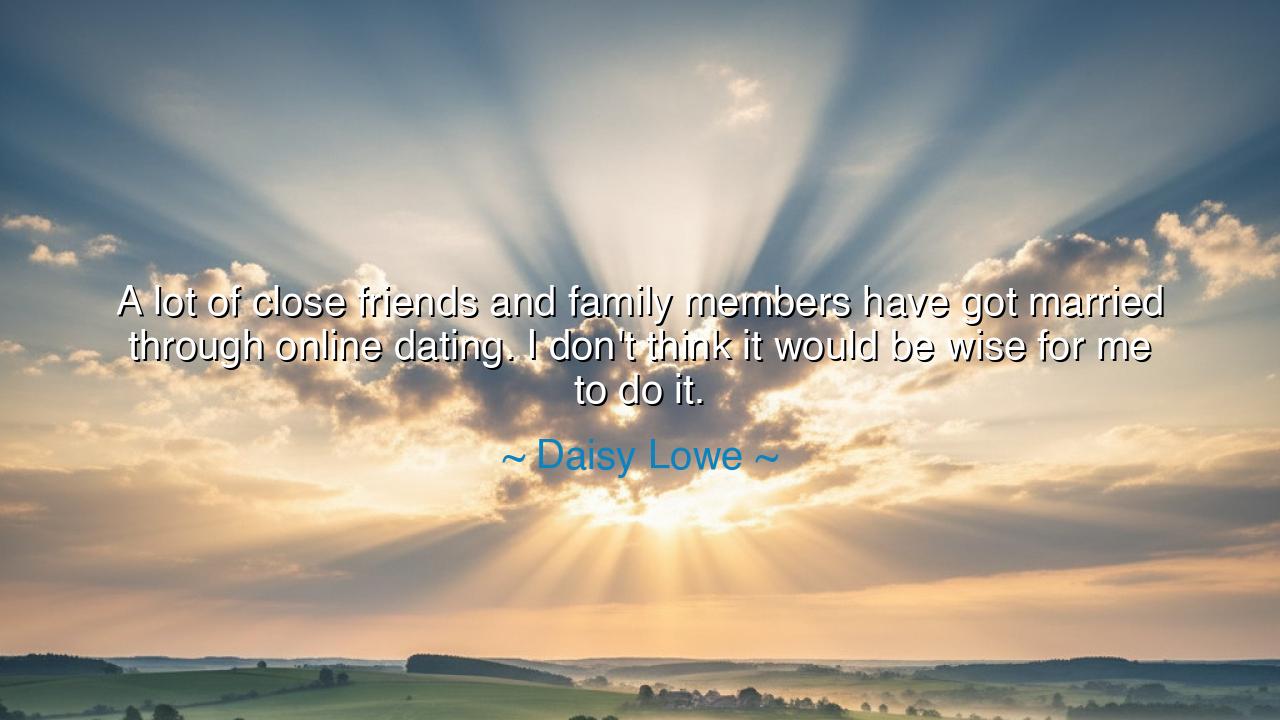
A lot of close friends and family members have got married
A lot of close friends and family members have got married through online dating. I don't think it would be wise for me to do it.






In the hush between custom and choice, Daisy Lowe speaks with a measured candor: “A lot of close friends and family members have got married through online dating. I don’t think it would be wise for me to do it.” Hear the double chord—affirmation and refusal. She blesses the road that carried others safely home, yet keeps her own feet from that path. The saying is not a verdict on technology; it is the guarding of a threshold. For every gate that opens, there must be a keeper who knows which doors are meant for them and which are not.
Mark the balance she strikes. She honors the fruit: real vows, real rings, real dinners in houses now warm with laughter—close friends and family members who found their beloved by the glow of a screen. But then she turns inward and consults a quieter oracle: her particular life, its pressures and exposures, its need for privacy and pace. To call something not wise for oneself is to practice the elder art of discernment. Wisdom is not one-size; it is a garment tailored to the weather of one’s soul.
The ancients knew this distinction. Some traveled with caravans; others preferred the hidden footpath; both reached the city if they chose well. In the same spirit, online dating can be a bustling marketplace—efficient, abundant, dazzling with options—ideal for the pilgrim who thrives amid many voices. But a public figure, or anyone whose safety and serenity are easily disturbed by glare, may find the marketplace too loud for listening. The heart sometimes needs a cloister to hear its own answer.
A story to make the saying flesh: a composer I once knew watched two siblings meet partners on an app and later married—households blooming, children learning to walk between pianos and plants. He rejoiced for them. But when he tried the same, his inbox became a stage; curiosity about his work eclipsed curiosity about his person. Dates felt like interviews, algorithms like auditions. He stepped back, not from love, but from the method. He returned to small rooms—salons, friends-of-friends, shared causes—and there, in a kitchen after a chamber concert, he found a listener who heard the man before the music. What was wise for him was not what was wise for his kin.
History keeps an older mirror. In villages once, the matchmaker’s bench stood beside the well. Many met there and vowed for life—blessings on them. But some—poets, healers, those wary of the village’s noisy advice—found their partners through letters, apprenticeships, pilgrimages. The tradition was not wrong; it was simply not theirs. So too now: the app is a modern well, and plenty draw good water from it. Yet no one is obliged to drink there if another spring better suits their thirst.
From Daisy Lowe’s line we glean a rule worth handing down: praise what works for others; choose what works for you. Let results around you inform, but let your interior weather decide. Ask not only “Does this method produce marriages?” but also “Does this method protect my peace, my safety, my sense of being seen rightly?” For a path can be fruitful in general and yet unkind in particular.
Practical counsel for the road of discernment: (1) Name your non-negotiables—privacy, depth, shared circles—and test any method against them. (2) If you forgo online dating, widen the village by other means: host small salons, join service projects, study in communities of craft; proximity with purpose is a fine matchmaker. (3) Use trusted introducers; let close friends and family members curate encounters aligned with your values. (4) If you do sample the apps, design for safety and scarcity—pseudonymous begins, minimal exposure, clear exit ramps—and leave at the first sign the medium is warping the message. (5) Above all, bless the choices of others without borrowing them. Wisdom is local; fidelity to your own soul is the surest compass.
Thus the saying stands like a boundary stone carved with courtesy: many roads lead to love, and this one—though good for many—is not mine. Keep such boundary stones bright, and you will not wander by any crowd’s insistence. For the heart that honors its own wisdom does not walk alone; it walks with peace, and peace is the finest traveling companion to the home you seek.






AAdministratorAdministrator
Welcome, honored guests. Please leave a comment, we will respond soon